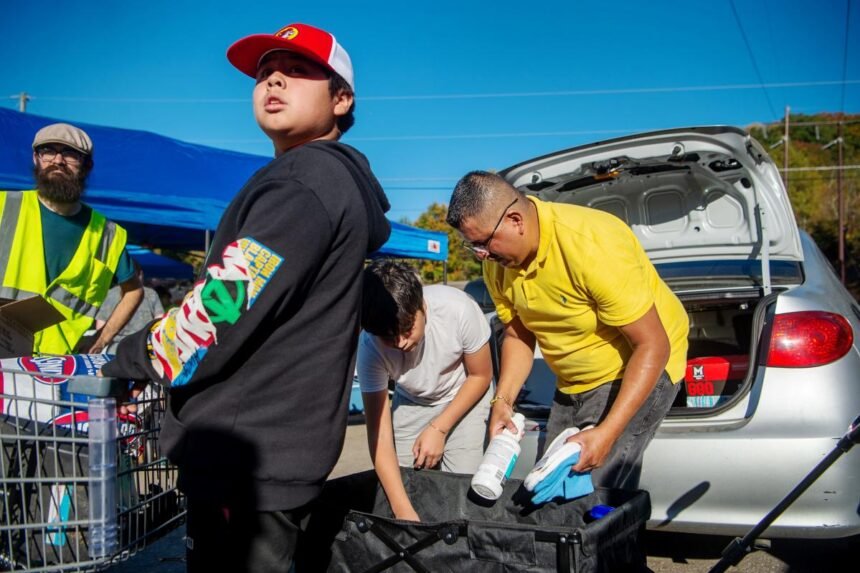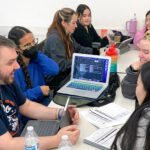SWANNANOA – Two men guided broken, mud-covered cars out of what used to be Joaquin Oronella’s Swannanoa tire shop on a late October Tuesday.
As they worked, a bucket loader pulled tons of debris and material from the remains of Oronella’s home, right next to his shop.
While Oronella and his volunteers worked on his shop, across town, Abraham Miranda-Gonzalez, his wife, his 11-year-old son, and his son’s friend waited in line at the first distribution site he found where people spoke Spanish.
His son’s friend was the only one among them who spoke both English and Spanish fluently. Miranda-Gonzalez had come to rely on him for help in finding resources. Earlier that day, the 12-year-old helped them figure out how to apply for the Supplemental Nutrition Assistance Program.

The growing community of Mexicans and Central Americans in Swannanoa faces unique challenges as it begins to heal from Tropical Storm Helene.
Residents confront uncertainties about resources while grappling with language barriers that complicate access to crucial information.
While Oronella tackles these struggles with the help of friends, family, and community support, others, like Miranda-Gonzalez, find themselves on the outskirts of a community they hoped to be part of.
Growing Latino presence in Swannanoa

Oronella, who has spent 24 years in Buncombe County, said he has seen how Swannanoa has changed over the years.
He built his tire shop 10 years ago, he said, “when the Latino community here was still growing.”
In North Carolina, between 2010 and 2020, the state’s Hispanic population grew by nearly 320,000 new residents—the largest increase among any racial or ethnic group over that decade, according to Carolina Demography, a research organization at the University of North Carolina at Chapel Hill.
Businesses owned by Hispanic members of the community have appeared to have been increasing in that time, according to Fernando Uribe, who’s owned a Mexican restaurant in Swannanoa for the last 12 years.
Uribe moved to Swannanoa 15 years ago from Texas to chase his dream of owning his own restaurant and ended up making it a family business after he met his wife.

When he first started, he felt like one of the only Latino-owned businesses. Over the years, he has seen that change.
“Eventually, I started to see shops pop up, mostly automotive at first, but then more diverse businesses,” Uribe said. “Up until the hurricane, there was a sense that it would keep growing.”
His restaurant didn’t suffer most any damage, he said. He says a prayer every morning before work and has deep sense of faith. He believes it’s kept him and his family safe.
But he sees and hears of all the other stories from the other business owners daily.
“We are such a small community that we all know each other pretty well,” he said. “I try to keep them going, keep their spirits up.”
And though the business landscape has been flattened, he has hope.
Uribe said watching the reconstruction from his restaurant felt like starting over, watching the businesses pop up, just like when he first opened.
Storm leaves family feeling unwelcome in Swannanoa

Miranda-Gonzalez, originally from Mexico, moved to Swannanoa two years ago, drawn by the promise of work and support from relatives. But since the storm, things have changed.
“The relatives I rent from have turned cold,” he said. “It’s like they don’t want us there anymore.”
Miranda-Gonzalez and his family have struggled to find resources and figure out what to do next.
On Tuesday, they attended a local distribution event where they were able to pick up essentials. “We needed this,” he said.
Miranda-Gonzalez doesn’t speak English fluently, which has made it difficult to know where to apply for aid.
“It’s hard to ask for help when you don’t know the language,” he said.
He and his wife were just starting to build their life in Swannanoa when the storm hit.
“We lost our savings, and now we don’t know what to do other than keep looking for work,” he said.
In some places, Miranda-Gonzalez has faced resistance and even racism. “At one place, they asked me why I would come to a country I’m so unfamiliar with,” he said.
For more than a week after the storm, his wife couldn’t get in touch with her family back in Mexico.

“We couldn’t get word to them that we were all right,” he said. “We didn’t know when that would change because most of the information we could get was word of mouth, and we didn’t know many people.”
Despite these challenges, there have been glimmers of support.
Through his son’s friend, they found help locating distribution places.
His family has also been able to take showers at a factory where he and others used to work.
He said that some of the other workers from the factory have done the same and through them, he’s been able to share some information about resources.
For Miranda-Gonzalez, the storm wasn’t just a weather event—it was a turning point that made him feel unwelcome in the community he once hoped to call home.
“I feel left behind,” he said. “Right now, our biggest priority is finding work and a new place to live.”
Despite destruction, hope persists for El Salvadorian tire shop owner

While Oronella lost both his home and business, he has received strong community support.
“Our Latino community here is small,” he said, “but with everything that’s happened, we’ve seen everyone come together.”
Walking through the remains of his home, which had been submerged in 10 to 11 feet of water, he pointed to the frame of his mother’s mobile home.
“The flood completely destroyed her house, but she was in El Salvador at the time, which was a blessing,” he said.
Floodwaters left stains on the top of his roof. Oronella remembers how he and his brother-in-law made it out of the house and watched the waters rise by the church up the street.
“We were just up there, and I was in total shock watching the waters swallow everything,” he said. “For days, I would have moments when I’d freeze up and forget what I was doing.”
In the days after the flood, neighbors helped Oronella and his brother-in-law begin cleaning out the house.

The community’s ongoing support—food, resources, and help with cleanup—has also helped him cope with the shock, he said.
A local church offered to demolish his house at no cost when it became clear it couldn’t be saved.
Oronella was able to apply for federal assistance with the help of his daughters, who translated for him.
Cars covered in muddy water, broken and demolished by debris, lined the outside of Oronella’s tire shop, which was next door to his home.
“We lost all our tools and over 20 cars, but the shop itself is still standing,” he said. “That’s what matters.”
With shelter secured and some essentials in place, Oronella has turned his focus to reopening the shop.
He and his brothers spent the day working to clean it up, with help from friends who are hauling debris and trucks out of the garage.
Standing in front of a bay still filled with a foot of mud, Oronella remains optimistic.

“Maybe in two months, we’ll be back in business,” he said.
Oronella’s mother and brothers joined him as he spoke. His sister mentioned that their mother had been crying over losing her mobile home.
“We’re all right,” he reassured her. “We’re still here, and we’ve got each other.”
This article originally appeared on Asheville Citizen Times: Helene: Language barriers slow Latino community’s recovery from storm











